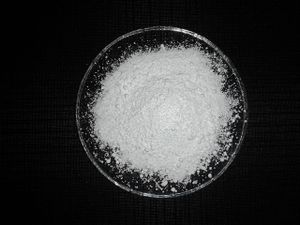Difference between revisions of "Sodium benzoate"
| Line 66: | Line 66: | ||
| pKb = | | pKb = | ||
| Solubility = 62.69 g/100 ml (0 °C)<br>62.78 g/100 ml (15 °C)<br>62.81 g/100 ml (20 °C)<br>62.87 g/100 ml (30 °C)<br>71.11 g/100 ml (100 °C) | | Solubility = 62.69 g/100 ml (0 °C)<br>62.78 g/100 ml (15 °C)<br>62.81 g/100 ml (20 °C)<br>62.87 g/100 ml (30 °C)<br>71.11 g/100 ml (100 °C) | ||
| − | | SolubleOther = | + | | SolubleOther = Soluble in liq. [[ammonia]], [[pyridine]] |
| Solubility1 = 0.0000818 g/100 g (25 °C) | | Solubility1 = 0.0000818 g/100 g (25 °C) | ||
| Solvent1 = 1,4-Dioxane | | Solvent1 = 1,4-Dioxane | ||
| Line 125: | Line 125: | ||
===Physical=== | ===Physical=== | ||
| − | Sodium benzoate is a white hygroscopic compound, with a characteristic smell. It has a solubility in water of 62.7 g/100 | + | Sodium benzoate is a white hygroscopic compound, with a characteristic smell. It has a solubility in water of 62.7 g/100 ml at standard conditions. Sodium benzoate is also soluble in liquid ammonia and pyridine. It is poorly soluble in most alcohols, like [[methanol]] and [[ethanol]]. |
==Availability== | ==Availability== | ||
| Line 136: | Line 136: | ||
*[[Benzene]] synthesis | *[[Benzene]] synthesis | ||
*Make benzoic acid | *Make benzoic acid | ||
| + | *Make benzoic acid esters | ||
*Whistle mix | *Whistle mix | ||
| + | *Food preservative | ||
==Handling== | ==Handling== | ||
| Line 142: | Line 144: | ||
Sodium benzoate has low toxicity to humans, and recent studies have shown to have some beneficial effects, in preventing Alzheimer and Parkinson's, though the results aren't conclusive so far. Cats however, have a significantly lower tolerance against benzoic acid and its salts, than rats and mice. | Sodium benzoate has low toxicity to humans, and recent studies have shown to have some beneficial effects, in preventing Alzheimer and Parkinson's, though the results aren't conclusive so far. Cats however, have a significantly lower tolerance against benzoic acid and its salts, than rats and mice. | ||
| − | + | If consumed with ascorbic acid, it may yield benzene, which is carcinogen, phenomenon observed in drinks containing sodium benzoate as preservative. However the levels of benzene obtained are extremely small, and studies have shown that the concentration of benzene is well below the safety limit. | |
===Storage=== | ===Storage=== | ||
| − | + | Sodium benzoate should be stored in closed bottles, as it's slightly hygroscopic, though keeping it in a dry chamber is sufficient. | |
===Disposal=== | ===Disposal=== | ||
Revision as of 10:46, 31 December 2017
 Sodium benzoate from the store.
| |
| Names | |
|---|---|
| IUPAC name
Sodium benzoate
| |
| Other names
Antimol
Benzoate of soda E211 Sobenate | |
| Properties | |
| C7H5O2Na C6H5COONa | |
| Molar mass | 144.10 g/mol |
| Appearance | White solid |
| Odor | Odorless |
| Density | 1.497 g/cm3 |
| Melting point | 410 °C (770 °F; 683 K) (decomposes) |
| Boiling point | Decomposes |
| 62.69 g/100 ml (0 °C) 62.78 g/100 ml (15 °C) 62.81 g/100 ml (20 °C) 62.87 g/100 ml (30 °C) 71.11 g/100 ml (100 °C) | |
| Solubility | Soluble in liq. ammonia, pyridine |
| Solubility in 1,4-Dioxane | 0.0000818 g/100 g (25 °C) |
| Solubility in ethanol | 2.3 g/100 g (25 °C) 8.3 g/100 g (78 °C) |
| Solubility in methanol | 8.22 g/100 g (15 °C) 7.55 g/100 g (66.2 °C) |
| Vapor pressure | 2.9·10-12 mmHg (25 °C) |
| Hazards | |
| Safety data sheet | Sigma-Aldrich |
| Flash point | 100 °C (212 °F; 373 K) |
| Lethal dose or concentration (LD, LC): | |
| LD50 (Median dose)
|
4,100 mg/kg (rat, oral) |
| Related compounds | |
| Related compounds
|
Benzoic acid |
| Except where otherwise noted, data are given for materials in their standard state (at 25 °C [77 °F], 100 kPa). | |
| Infobox references | |
Sodium benzoate is an organic chemical compound, used as a food preservative.
Contents
Properties
Chemical
Sodium benzoate will react with sodium hydroxide to produce benzene:
- C6H5COONa + NaOH → C6H6 + Na2CO3
Ascorbic acid will also reduce the salt to benzene.
Physical
Sodium benzoate is a white hygroscopic compound, with a characteristic smell. It has a solubility in water of 62.7 g/100 ml at standard conditions. Sodium benzoate is also soluble in liquid ammonia and pyridine. It is poorly soluble in most alcohols, like methanol and ethanol.
Availability
Sodium benzoate is available as a food preservative, sold in sealed bags.
Preparation
Sodium benzoate can be prepared by reacting benzoic acid and sodium hydroxide, bicarbonate or carbonate.
Projects
- Benzene synthesis
- Make benzoic acid
- Make benzoic acid esters
- Whistle mix
- Food preservative
Handling
Safety
Sodium benzoate has low toxicity to humans, and recent studies have shown to have some beneficial effects, in preventing Alzheimer and Parkinson's, though the results aren't conclusive so far. Cats however, have a significantly lower tolerance against benzoic acid and its salts, than rats and mice.
If consumed with ascorbic acid, it may yield benzene, which is carcinogen, phenomenon observed in drinks containing sodium benzoate as preservative. However the levels of benzene obtained are extremely small, and studies have shown that the concentration of benzene is well below the safety limit.
Storage
Sodium benzoate should be stored in closed bottles, as it's slightly hygroscopic, though keeping it in a dry chamber is sufficient.
Disposal
Sodium benzoate has low toxicity and doesn't require special disposal. Discard it as you wish.